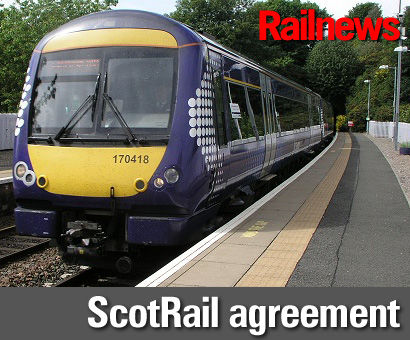RMT and ASLEF are recommending that their members accept a staffing agreement on ScotRail trains in the central belt which keeps conductors in their traditional 'safety critical' role.
The RMT said new Hitachi trains for the Edinburgh-Glasgow electrification are to be modified with the installation of conductors' door control panels.
The ScotRail Alliance has described the settlement as a 'win-win' result for both sides, while the development is being seen by the unions as a possible step towards peace in the related dispute affecting Govia Thameslink Railway's Southern routes.
Several months of discussions with Abellio about proposals to replace conductors with non-safety critical ticket examiners have produced a draft settlement and the union is hailing the result, saying that it 'protects Guards and their safety critical role on Scotrail in what RMT has described as “a major breakthrough in the battle against Driver Only Operation, which the union will now use as a benchmark in talks with other companies where guards are under threat, including Southern Rail”'.
ASLEF said: "The agreement retains conventional staffing of the electric trains and guarantees that drivers will continue to energise doors while conductors will perform platform interface duties and close doors, before signalling to the driver that it is safe to depart."
RMT general secretary Mick Cash told his members: "This principal agreement applies to ScotRail EMU services on the following newly electrified routes: Edinburgh to Glasgow via Falkirk High; Edinburgh to Glasgow via Shotts; Edinburgh to Dunblane; Glasgow to Stirling, Dunblane and Alloa, and Glasgow to Edinburgh via Falkirk Grahamston.
“This proposal will also apply to existing EMU services that are conductor operated and part of the North Berwick-Carstairs-Glasgow routes. All the specified services will operate as conventionally staffed with a competent conductor on board.
“This agreement retains conventional staffing of the electric trains on the above routes. Hitachi has been instructed to fit door control panels to Class 385 rolling stock.
“This agreement guarantees a guard on every new electrified train and that the conductor will retain full competency (rules, track safety, evacuation). In addition ScotRail confirm that trains operating these services will not run without a competent conductor on board.”
Mr Cash said that the development is "more than just a victory for ScotRail, it is a victory for the defence of the role of the guard and a step forward in our continuing campaign against Driver Only Operation".
Phil Verster of the ScotRail Alliance described the deal with the RMT and ASLEF as a 'way forward'.
He told the BBC: "[It] will have to go through a process of referenda with their respective members to get final approval, but we think we are there with an agreement that's a win-win for both parties.
"Once every 40 years, when you introduce new trains you have an opportunity to make a change in the operating practices for the fleet, so we had to explore what was possible with our new fleet coming in next year.
"And so in the end it's a compromise, and it's a win-win for both parties and we are now keen to just focus on the future and how we continue to transform and improve Scotland's railways for our customers. I don't foresee any strikes from this point onwards on this issue."
RMT and ASLEF members will now be asked to approve their executives' recommendations via ballots.


